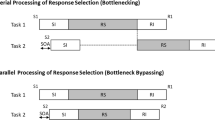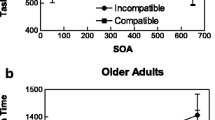Abstract.
In contradiction to stimulus-response- (S-R-) translation bottleneck models of dual-task control, stimulus processing in a primary task is affected by its compatibility with the response in a secondary, later performed task (Hommel, 1998a)– an indication of parallel S-R translation. Here we show that this backward-compatibility effect is independent of working-memory load, whether this is induced by an extra memory task (Experiment 1) or by increasing the number of S-R alternatives in the primary task (Experiment 2). However, backward effects occur even when the secondary task is no longer carried out (Experiment 3) and they are strongly affected by the inconsistency of previously used S-R mappings (Experiment 4). These findings suggest that S-R translation is (or can be) capacity-independent and automatic even under multiple-task conditions, and that it is mediated by direct S-R associations that emerge after only little practice.
Similar content being viewed by others
Author information
Authors and Affiliations
Additional information
Electronic Publication
Rights and permissions
About this article
Cite this article
Hommel, B., Eglau, B. Control of stimulus-response translation in dual-task performance. Psychological Research 66, 260–273 (2002). https://doi.org/10.1007/s00426-002-0100-y
Accepted:
Issue Date:
DOI: https://doi.org/10.1007/s00426-002-0100-y




